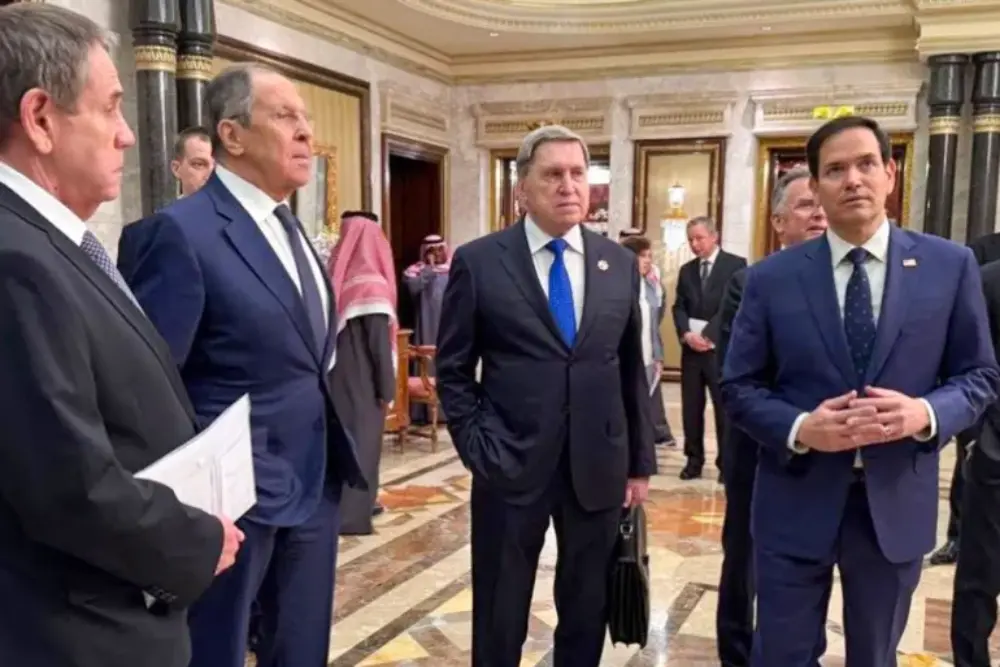
However, the talks have also raised concerns, particularly in Ukraine, where leaders remain wary of any settlement that does not involve direct Ukrainian participation.
Following the negotiations, U.S. Secretary of State Marco Rubio expressed optimism about the outcome, stating that both sides had reached a broad consensus on three key objectives: restoring diplomatic personnel in their respective embassies in Washington and Moscow, forming a high-level team to facilitate peace talks for Ukraine, and exploring avenues for closer economic cooperation.
Russian Foreign Minister Sergei Lavrov echoed Rubio’s sentiments, calling the discussions «very useful.» He emphasized that both nations had engaged in meaningful dialogue and demonstrated a willingness to listen to each other.
«We not only listened, but also heard each other,» he said.
«It was not bad,» Ushakov replied when asked by Channel One about the negotiations between the two delegations. «We had a serious discussion about all the issues we wanted to address.»
The countries agreed to «lay the groundwork for future cooperation» on improving bilateral ties and ending the war in Ukraine, a State Department spokesperson said.
According to him, the Russian Federation and the United States have agreed to take into account each other’s interests. «We just agreed that we would consider each other’s interests. But at the same time, we should also promote bilateral relations, since both Moscow and Washington are interested in this,» the Kremlin spokesman said.
A spokesperson from the U.S. State Department later confirmed that the talks had set the stage for future cooperation between the two nations.
Ukrainian President Volodymyr Zelensky expressed strong reservations about the talks, stating that Kyiv «cannot recognize» any peace agreement that does not include Ukraine as an active participant. His remarks underscore the ongoing distrust between Ukraine and Russia, as well as concerns that any settlement reached without Ukrainian input could undermine the country’s sovereignty.
Adding to the uncertainty, there was speculation that the talks in Riyadh could lead to an official meeting between Russian President Vladimir Putin and U.S. President Donald Trump. However, Ushakov dismissed the possibility of an imminent summit, stating, «A meeting between the presidents of Russia and the United States is unlikely to take place next week. It is difficult to set a specific date at this stage.»
«It is difficult to name a specific date for the meeting between Putin and Trump.»
In addition, there was talk of a rapprochement between the positions of Russia and the United States, but so far it is difficult to say that it is happening, Ushakov said. «It’s hard to say yet that [the positions of the Russian Federation and the United States] are getting closer, but there was a conversation about it,» he said.
«We have said, including the American side, that two great superpowers cannot not communicate, engage in dialogue, and understand each other, as they did under U.S. President Joe Biden,» said Kirill Dmitriev, head of the Russian Direct Investment Fund (RDIF).
He stressed that «there was a very respectful, positive, constructive communication.»
A key outcome of the Riyadh talks was the decision by Lavrov and Rubio to establish high-level negotiation teams tasked with drafting a framework for peace in Ukraine. According to U.S. State Department representative Tammy Bruce, the objective is to create a ceasefire agreement.
«During the talks, U.S. and Russian officials agreed <…> to appoint appropriate high-level teams to begin work on ending the conflict in Ukraine as soon as possible in a way that is durable, sustainable and acceptable to all parties.»
They also agreed on « Laying the groundwork for future cooperation on matters of mutual geopolitical interest and historic economic and investment opportunities which will emerge from a successful end to the conflict in Ukraine» — U.S. Department of State.
One of the most contentious aspects of the proposed settlement is a U.S.-Russia-backed three-step peace plan, first reported by Fox News.
«The United States and Russia are proposing a three-step peace plan… This plan includes a cease-fire, elections in Ukraine, and then the signing of a final agreement,» Fox News reporter Jackie Heinrich wrote on the social network X.
She reported that both the U.S. and Russia view new elections in Ukraine as a crucial element of the settlement process. However, this proposal is likely to be contentious.
While the Riyadh talks may not have led to immediate breakthroughs, they have laid the groundwork for further discussions. Whether these negotiations will result in meaningful progress toward ending the war in Ukraine remains uncertain. However, one thing is clear: the diplomatic landscape is shifting, and the outcome of these talks could have lasting implications for global geopolitics.










Comments